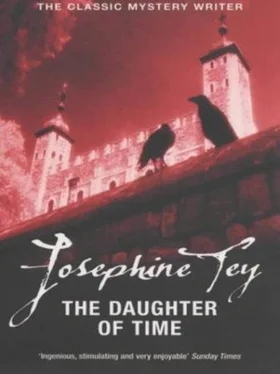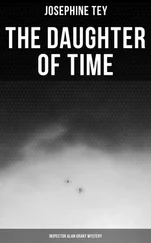(d) He took immediate steps to secure the persons of all the other heirs to the crown, and kept them in close arrest until he could with the minimum of scandal get rid of them.
(e) He had no right whatever to the throne. Since the death of Richard, young Warwick was de jure King of England.
It occurred to Grant for the first time, as he wrote it out, that it had been within Richard’s power to legitimise his bastard son John, and foist him on the nation. There was no lack of precedent for such a course. After all, the whole Beaufort clan (including Henry’s mother) were the descendants not only of an illegitimate union but of a double adultery. There was nothing to hinder Richard from legitimising that ‘active and well-disposed’ boy who lived in recognised state in his household. It was surely the measure of Richard that no such course had apparently crossed his mind. He had appointed as his heir his brother’s boy. Even in the destitution of his own grief, good sense was his ruling characteristic. Good sense and family feeling. No base-born son, however active and well-disposed, was going to sit in the Plantagenets’ seat while his brother’s son was there to occupy it.
It was remarkable how that atmosphere of family feeling permeated the whole story. All the way from Cicely’s journeyings about in her husband’s company, to her son’s free acknowledgement of his brother George’s boy as his heir.
And it occurred to him too for the first time in full force just how that family atmosphere strengthened the case for Richard’s innocence. The boys whom he was supposed to have put down as he would put down twin foals were Edward’s sons; children he must have known personally and well. To Henry, on the other hand, they were mere symbols. Obstacles on a path. He may never even have set eyes on them. All questions of character apart, the choice between the two men as suspects might almost be decided on that alone.
It was wonderfully clearing to the head to see it neat and tidy as (a), (b), and (c). He had not noticed before how doubly suspect was Henry’s behaviour over Titulus Regius. If, as Henry had insisted, Richard’s claim was absurd, then surely the obvious thing to do was to have the thing re-read in public and demonstrate its falsity. But he did no such thing. He went to endless pains to obliterate even the memory of it. The conclusion was inevitable that Richard’s title to the crown as shown in Titulus Regius was unassailable.
On the afternoon when Carradine reappeared in the room at the hospital Grant had walked to the window and back again, and was so cock-a-hoop about it that The Midget was moved to remind him that it was a thing that a child of eighteen months could do. But nothing could subdue Grant today.
‘Thought you’d have me here for months, didn’t you,’ he crowed.
‘We are very glad to see you better so quickly,’ she said primly; and added: ‘We are, of course, very glad, too, to have your bed.’
And she clicked away down the corridor, all blonde curls and starch.
Grant lay on his bed and looked at his little prison room with something approaching benevolence. Neither a man who has stood at the Pole nor a man who has stood on Everest has anything on a man who has stood at a window after weeks of being merely twelve stones of destitution. Or so Grant felt.
Tomorrow he was going home. Going home to be cosseted by Mrs Tinker. He would have to spend half of each day in bed and he would be able to walk only with the aid of sticks, but he would be his own man again. At the bidding of no one. In tutelage to no half-pint piece of efficiency, yearned over by no lump of out-sized benevolence.
It was a glorious prospect.
He had already unloaded his hallelujahs all over Sergeant Williams, who had looked in on the completion of his chore in Essex, and he was now yearning for Marta to drop in so that he could peacock in front of her in his new-found manhood.
‘How did you get on with the history books?’ Williams had asked.
‘Couldn’t be better. I’ve proved them all wrong.’
Williams had grinned. ‘I expect there’s a law against that,’ he said.’ MI5 won’t like it. Treason or lèse-majesté or something like that it might turn out to be. You never know nowadays. I’d be careful if I was you.’
‘I’ll never again believe anything I read in a history book, as long as I live, so help me.’
‘You’ll have to make exceptions,’ Williams pointed out with Williams’ dogged reasonableness. ‘Queen Victoria was true, and I suppose Julius Caesar did invade Britain. And there’s 1066.’
‘I’m beginning to have the gravest doubts about 1066. I see you’ve tied up the Essex job. What is Chummy like?’
‘A thorough little blighter. Been treated soft all his life since he started stealing change from his Ma at the age of nine. A good belting at the age of twelve might have saved his life. Now he’ll hang before the almond blossom’s out. It’s going to be an early spring. I’ve been working every evening in the garden this last few days, now that the days are drawing out. You’ll be glad to sniff fresh air again.’
And he had gone away, rosy and sane and balanced, as befitted a man who was belted for his good in his youth.
So Grant was longing for some other visitor from the outside world that he was so soon to be a part of again, and he was delighted when the familiar tentative tap came on his door.
‘Come in, Brent!’ he called, joyfully.
And Brent came in.
But it was not the Brent who had last gone out.
Gone was the jubilation. Gone was his newly acquired breadth.
He was no longer Carradine the pioneer, the blazer of trails.
He was just a thin boy in a very long, very large overcoat. He looked young, and shocked, and bereaved.
Grant watched him in dismay as he crossed the room with his listless unco-ordinated walk. There was no bundle of paper sticking out of his mail-sack of a pocket today.
Oh, well, thought Grant philosophically; it had been fun while it lasted. There was bound to be a snag somewhere. One couldn’t do serious research in that light-hearted amateur way and hope to prove anything by it. One wouldn’t expect an amateur to walk into the Yard and solve a case that had defeated the pro’s; so why should he have thought himself smarter than the historians. He had wanted to prove to himself that he was right in his face-reading of the portrait; he had wanted to blot out the shame of having put a criminal on the bench instead of in the dock. But he would have to accept his mistake, and like it. Perhaps he had asked for it. Perhaps, in his heart of hearts, he had been growing a little pleased with himself about his eye for faces.
‘Hullo, Mr Grant.’
‘Hullo, Brent.’
Actually it was worse for the boy. He was at the age when he expected miracles to happen. He was still at the age when he was surprised that a balloon should burst.
‘You look saddish,’ he said cheerfully to the boy. ‘Something come unstuck.’
‘Everything.’
Carradine sat down on the chair and stared at the window.
‘Don’t these damned sparrows get you down?’ he asked, fretfully.
‘What is it? Have you discovered that there was a general rumour about the boys before Richard’s death, after all?’
‘Oh, much worse than that.’
‘Oh. Something in print? A letter?’
‘No, it isn’t that sort of thing at all. It’s something much worse. Something quite – quite fundamental. I don’t know how to tell you.’ He glowered at the quarrelling sparrows. ‘These damned birds. I can never write that book now, Mr Grant.’
‘Why not, Brent?’
‘Because it isn’t news to anyone. Everyone has known all about those things all along.’
Читать дальше












